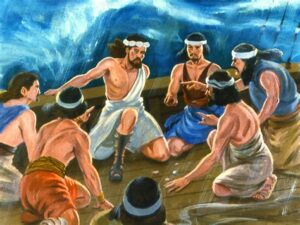They Drew Lots and Jonah was Singled Out
1: 7
They drew lots and Jonah was singled out DIG: What does narrator Yonah reveal that the sailors don’t know? Is the throwing of lots gambling? What history did Isra’el have with this peculiar way of finding out the truth about people or events? How did the process generally work? Is there any connection to the New Covenant? How so? Where? Why don’t we need to use this method of finding God’s will today? What did the sailors believe about the throwing of lots? Who really controlled the events behind the scenes?
REFLECT: Have you ever tried to run away from something you knew God wanted you to do? What was your Nineveh? What did you do? How did you distract yourself from obedience? What did ADONAI have to do to get your attention? What was your whale? How do you find the Lord’s will in your life?
The wind, the sailors, and the lots were each in the hands of the Grandmaster.

Commentary on scene two: While the captain of the ship attempted to arouse Jonah below, the sailors on deck concluded that there must be on board the one who was guilty of some great crime and they decided to throw lots in order to find out who he was. Today we recognize this as pure superstition. Yet Yonah, as narrator, has already revealed that divine responsibility for the storm rests with ADONAI (1:4). The sailors, however, still have to discover what the reader already knows.42 The purpose in throwing of lots was to make decisions, in this case to find the culprit. The practice was common in Isra’el (see my commentary on Exodus, to see link click Gb – The Urim and Thummin: The Means of Making Decisions) and other countries in the ancient Near East.
The Hebrew word goral, translated lot, is related to the Arabic word for stone: garila (be stony) or garwal (small stone). The process involved putting stones into the lap of one’s garment or into a container and shaking it until a stone come out. The exact procedure is not described but would be familiar to the first hearers of the story. At that time, those who loved the God of Abraham, Isaac and Jacob believed that HaShem guided the process. And the B’rit Chadashah indicates an addition to the process: when a replacement was needed for Judas, the procedure involved not only the throwing of lots but also the prayer of the messianic community (Acts 1:15-26). The expression in the New Covenant’s account of Matthias is the same as the Septuagint’s account of Yonah:
kai epesen ho kleros epi Ionan (Jonah 1:7 LXX)
and the lot fell to Jonah
kai epesen ho kleros epi Maththian (Acts 1:26)
and the lot fell to Matthias43
Today, the throwing of lots is not needed because the indwelling Ruach HaKodesh is totally sufficient for guidance in the life of every believer. And the Spirit does so in accordance with the Word of God.
The sailors continue to take the initiative while the reluctant recruit remained uncommitted. Because of his disobedience, he had no desire for prayer.
Although it is not seen in English, the interplay of Hebrew and Aramaic in the conversation shows that the sailors and Yonah are doing the best they can to communicate with each other. When speaking to each other, the sailors use an Aramaic expression: The men said to each other, “Let’s throw lots and find out who is responsible for [besellemi] this calamity to happen to us” (1:7a).44 The Targum paraphrases to sharpen the sailor’s request, “Tell us, for what reason is this evil upon us.” It was a common belief among sailors that the misconduct of one person might bring disaster upon the whole company.45 So God used their superstition. The use of a two-colored stone provided “yes” and “no” answers to specific questions. They drew lots, but ADONAI so controlled the results that the right person was picked and, not surprisingly to the reader, Jonah was singled out (1:7b CJB).
The superstitious sailors might have thought it was merely fate. But Yonah knew that the lot is thrown into the lap, but its every decision is from the LORD (Proverbs 16:33). As ADONAI had used the storm, He now uses the lot-casting to expose Jonah to the sailors and bring him to face his calling as a prophet. The wind, the sailors, and the lots are each in the hands of the Grandmaster.
Dear Holy and Awesome Heavenly Father, You are so wonderful! Praise You for how carefully You watch over Your children (John 1:12; First John 3:1, 3). Praise You that You are in control of every detail that touches Yourchild’s life. Your love is greater than anything that can happen to us-including death, for death of this earthly body means we can live in heaven (Second Corinthians 5:1) with Yeshua who loves us and whom we love! Who shall separate us from the love of Messiah? Shall tribulation, or distress, or persecution, or famine, or nakedness, or danger, or sword? As it is written, “For Your sake we are being put to death all day long; we are counted as sheep for the slaughter.” But in all these things we are more than conquerors through Him who loved us. For I am convinced that neither death nor life, nor angels nor principalities, nor things present nor things to come, nor powers, nor height nor depth, nor any other created thing will be able to separate us from the love of God that is in Messiah Yeshua our Lord (Romans 8:35-39). We love You! In Yeshua’s holy name and power of His resurrection. Amen



Leave A Comment